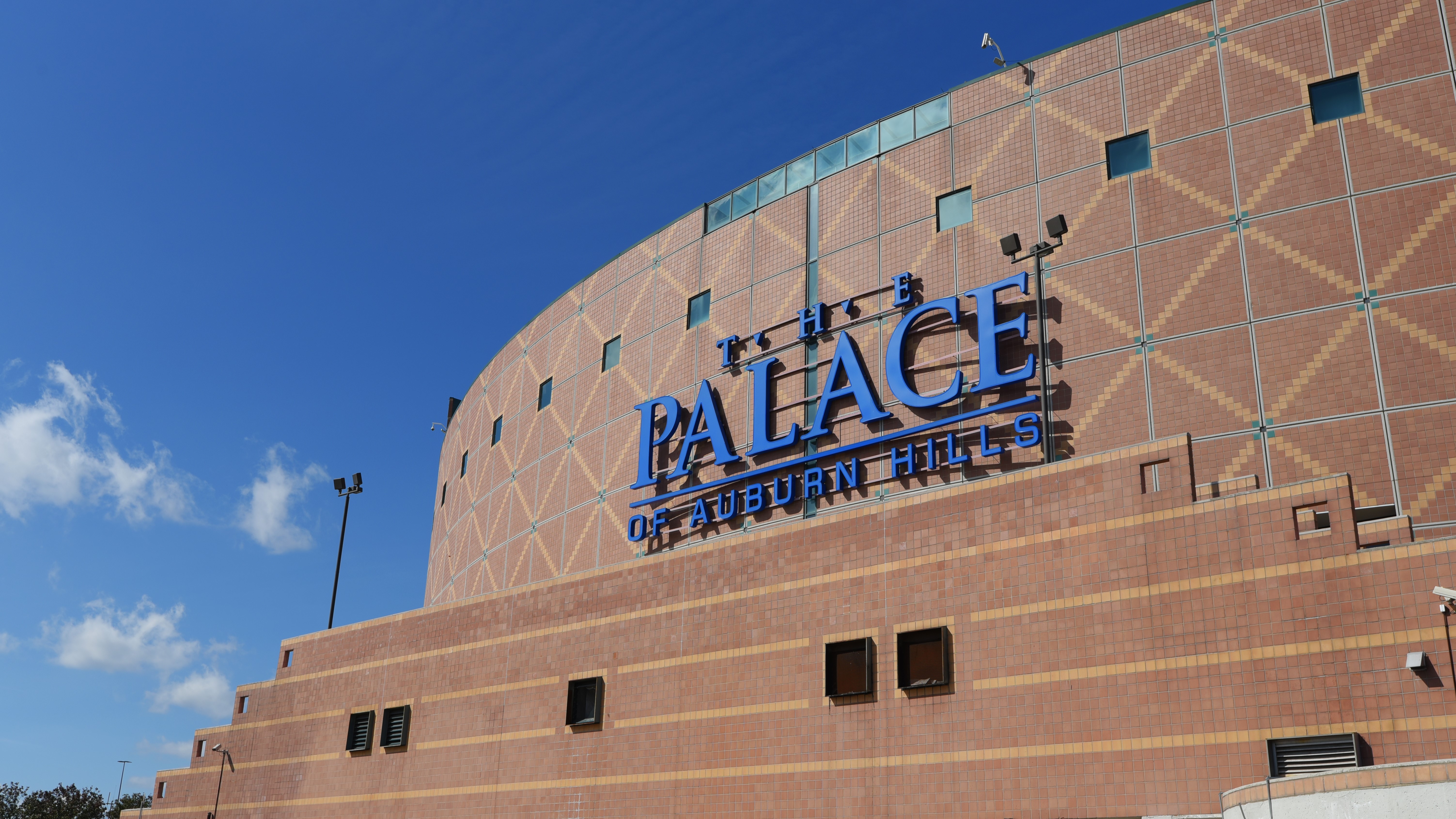
The Palace of Auburn Hills in Auburn Hills, Michigan, October 6, 2019. /VCG
The Palace of Auburn Hills in Auburn Hills, Michigan, October 6, 2019. /VCG
The Palace of Auburn Hills, former home arena of the Detroit Pistons, was leveled via implosion on Saturday. According to CNN, it took 800 pounds of explosives to demolish this 32-year-old arena with a capacity of 23,000 people.
The Pistons moved to The Palace in 1988 and left for the Little Caesars Arena in 2017. It was also used by the WNBA's Detroit Shock, the International Hockey League's Detroit Vipers, and several other teams as a home court.
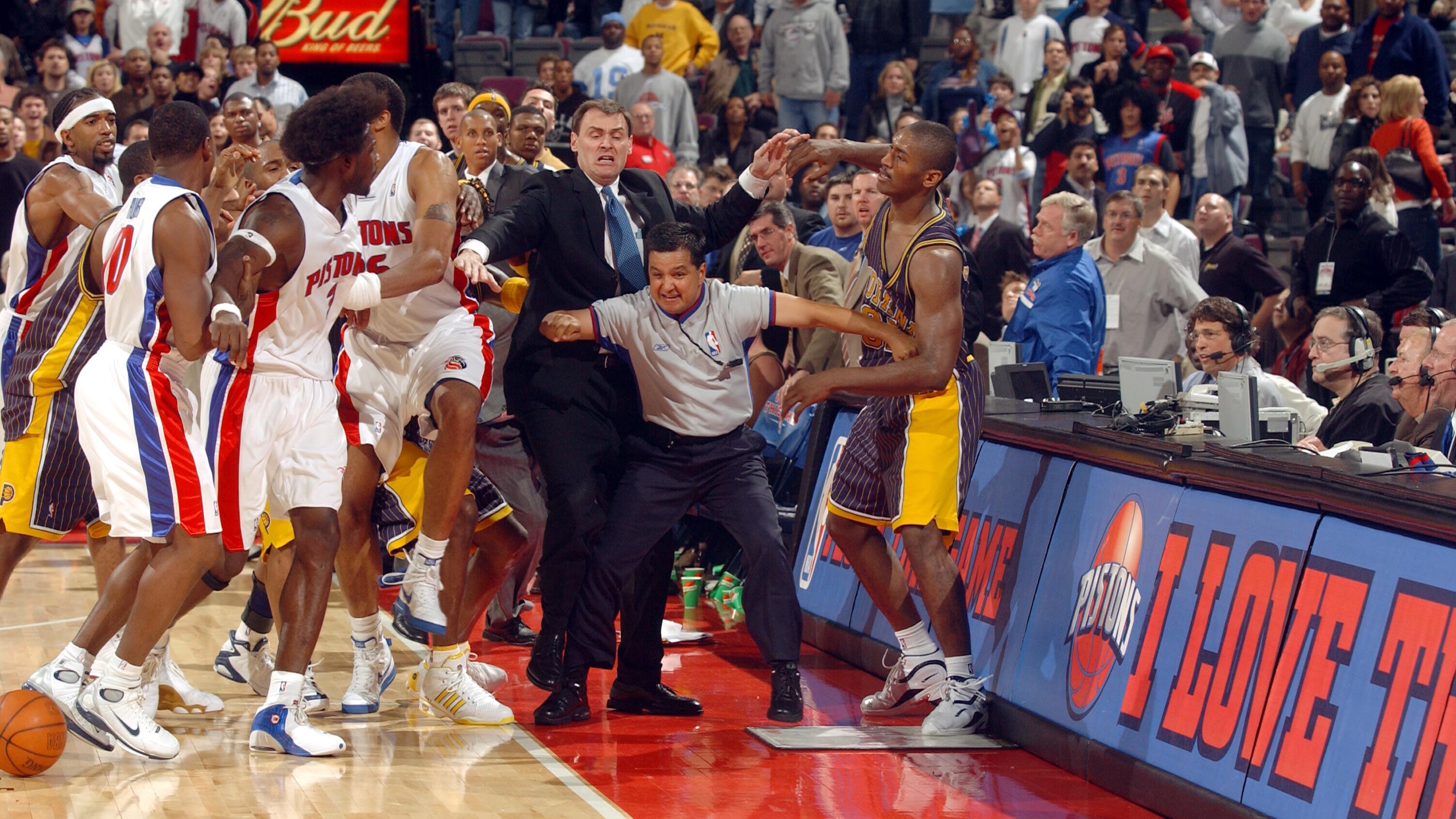
The referee (C) tries to seperate Ben Wallace #3 of the Detroit Pistons and Ron Artest of the Indiana Pacers in the game at The Palace of Auburn Hills, November 19, 2004. /VCG
The referee (C) tries to seperate Ben Wallace #3 of the Detroit Pistons and Ron Artest of the Indiana Pacers in the game at The Palace of Auburn Hills, November 19, 2004. /VCG
The first thing most recalled about The Palace was the Pacers–Pistons brawl, or to fans, the "Malice at the Palace," or to press, "the worst night in NBA history." On November 19, 2004, the Indiana Pacers visited The Palace to challenge the defending champions Pistons. The Pacers led 97-82 when there were only 45.9 seconds left – the game was long gone. Then Pistons center Ben Wallace was fouled hard by Ron Artest (today's Metta Sandiford-Artest) when he was trying to make a layup. Wallace shoved Artest angrily before players of the two teams clashed on the court.
It must be pointed out that things were not out of control at this point, and Artest, who started all this, did not attend the fight yet. He was lying on the scorer's table. Then a fan threw a drink onto Artest's face from the stands. That move triggered the notorious event. Artest charged after the fan immediately, and a massive fight between players and fans broke out in The Palace.
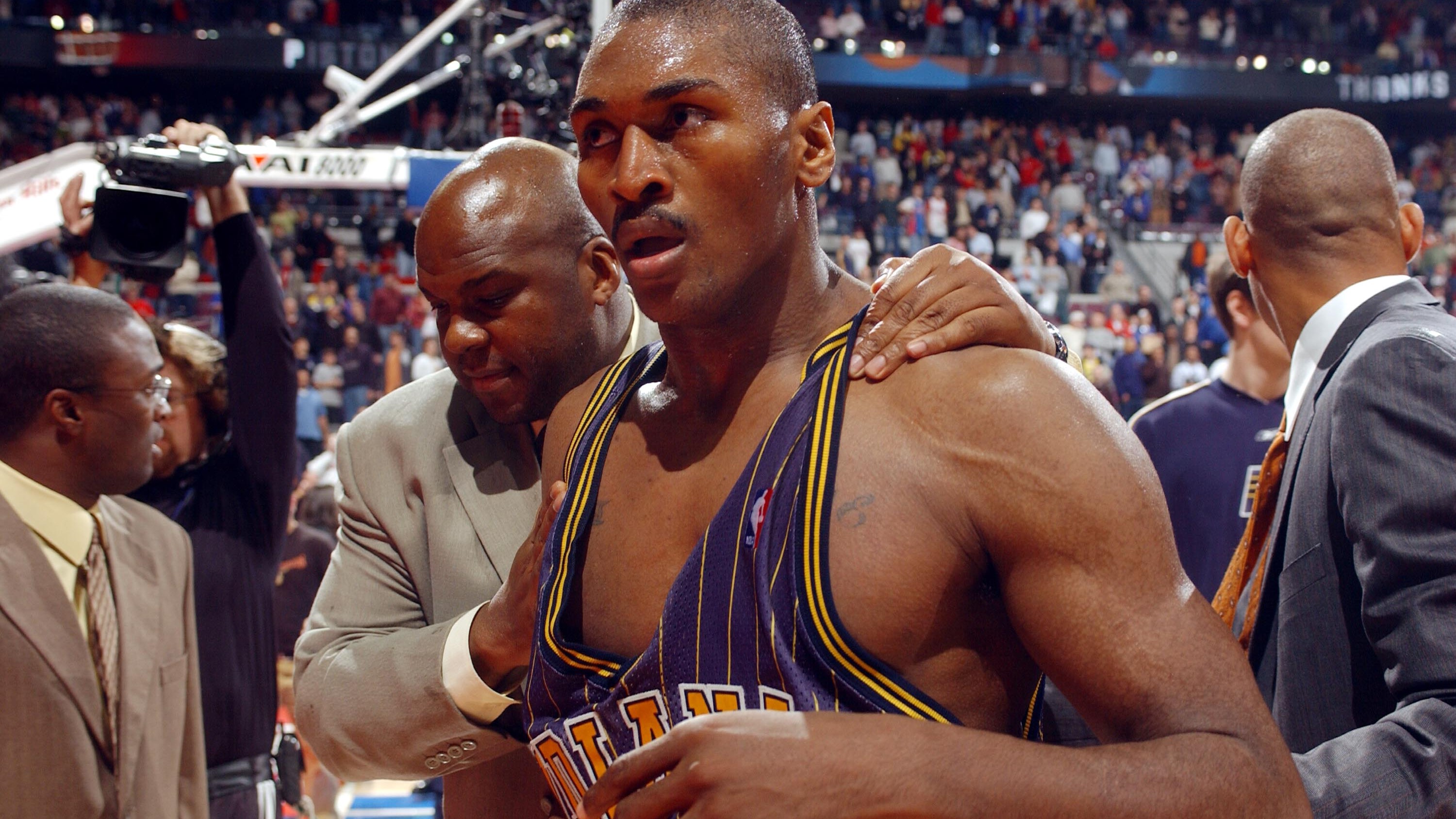
Ron Artest of the Indiana Pacers leaves the court after the game against the Detroit Pistons at The Palace of Auburn Hills, November 19, 2004. /VCG
Ron Artest of the Indiana Pacers leaves the court after the game against the Detroit Pistons at The Palace of Auburn Hills, November 19, 2004. /VCG
The following were the consequences of the Malice:
Nine players in total were suspended for 146 games. Artest was banned for the rest of the season, and he missed 86 games if the playoffs are counted.
Some 11 million U.S. dollars of player salaries were lost. It might not seem much, but remember this the salary cap in that season was only 43.87 million.
Five players were charged with assault and sentenced to a year of probation and community service.
Five fans were also charged and banned from attending Pistons home games for life.
The sales of alcoholic drinks were limited since then in NBA games.
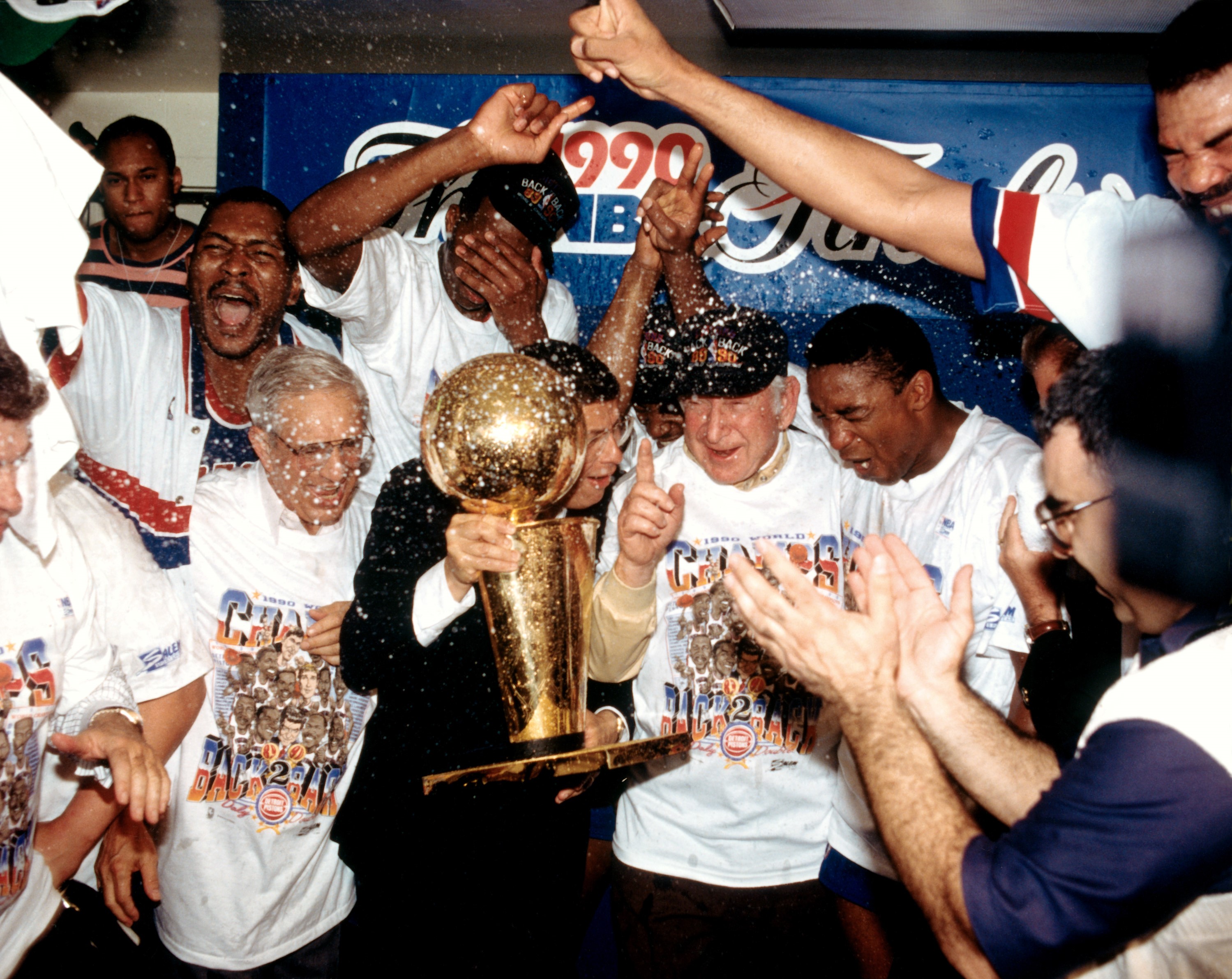
The Detroit Pistons celebrate after winning the NBA Championship in the NBA Finals at the Memorial Coliseum in Portland, Oregon, June 14, 1990. /VCG
The Detroit Pistons celebrate after winning the NBA Championship in the NBA Finals at the Memorial Coliseum in Portland, Oregon, June 14, 1990. /VCG
However, before the Malice happened, The Palace witness the greatest moments in the franchise history of the Pistons. The team won three NBA Championships in this arena. Two straight ones with the Bad Boys and Chuck Daly in 1989, 1990, one over the Los Angeles Lakers in 2004.
In fact, the Pistons already made the NBA Finals in 1988 and met the Los Angeles Lakers. Having led 3-2 after the first five games, the Pistons watched Isiah Thomas conduced one of the greatest performances in Finals history by scoring 25 points in the third quarter in G6. Nonetheless, the Pistons lost the game thanks to a controversial foul by Bill Laimbeer on Kareem Abdul-Jabbar. Moreover, Thomas suffered severe ankle spring and had to miss Game 7. In the end, the purple and gold defeated the Pistons to win their fifth title in the 1980s.
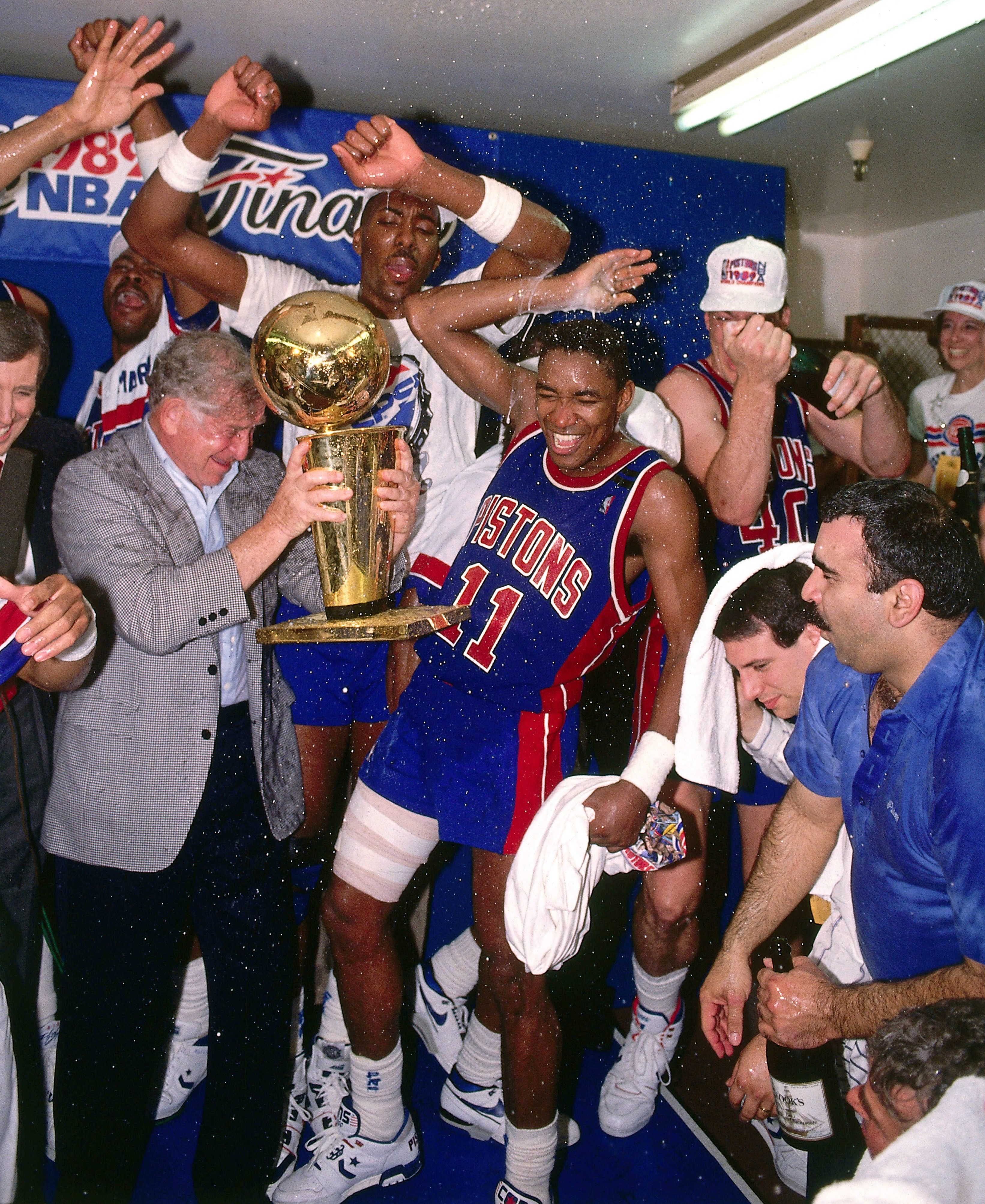
The Detroit Pistons celebrate after winning the NBA Championship in the NBA Finals at the Great Western Forum in Inglewood, California, June 13, 1989. /VCG
The Detroit Pistons celebrate after winning the NBA Championship in the NBA Finals at the Great Western Forum in Inglewood, California, June 13, 1989. /VCG
In the following 1989, the Pistons again went for the championship. Having finished the regular season with 63-19 record, they knocked out the Boston Celtics (Larry Bird only played six games this season because of injuries), the Milwaukee Bucks and the Chicago Bulls to enter the Finals, taking on the Lakers again. This time, 42-year-old Jabbar could not stop Laimbeer, John Salley, and their muscles, just like Magic Johnson and Byron Scott failed to stop Thomas and Joe Dumars. The Bad Boys swept the purple and gold to win their first title in franchise history.
In 1990, Detroit continued to intimidate the rest of the league with elbows, fists, tough defense, and effective offense. The team eliminated the Pacers, the New York Knicks, and again, the Bulls before reaching the Finals to meet the Portland Trail Blazers. Though coach Rick Adelman also had a group of brutal guys in his squad like Buck Williams. The Bad Boys knew too well how to make the series physical and win. In only five-game, Detroit destroyed Portland to pocket their second championship.
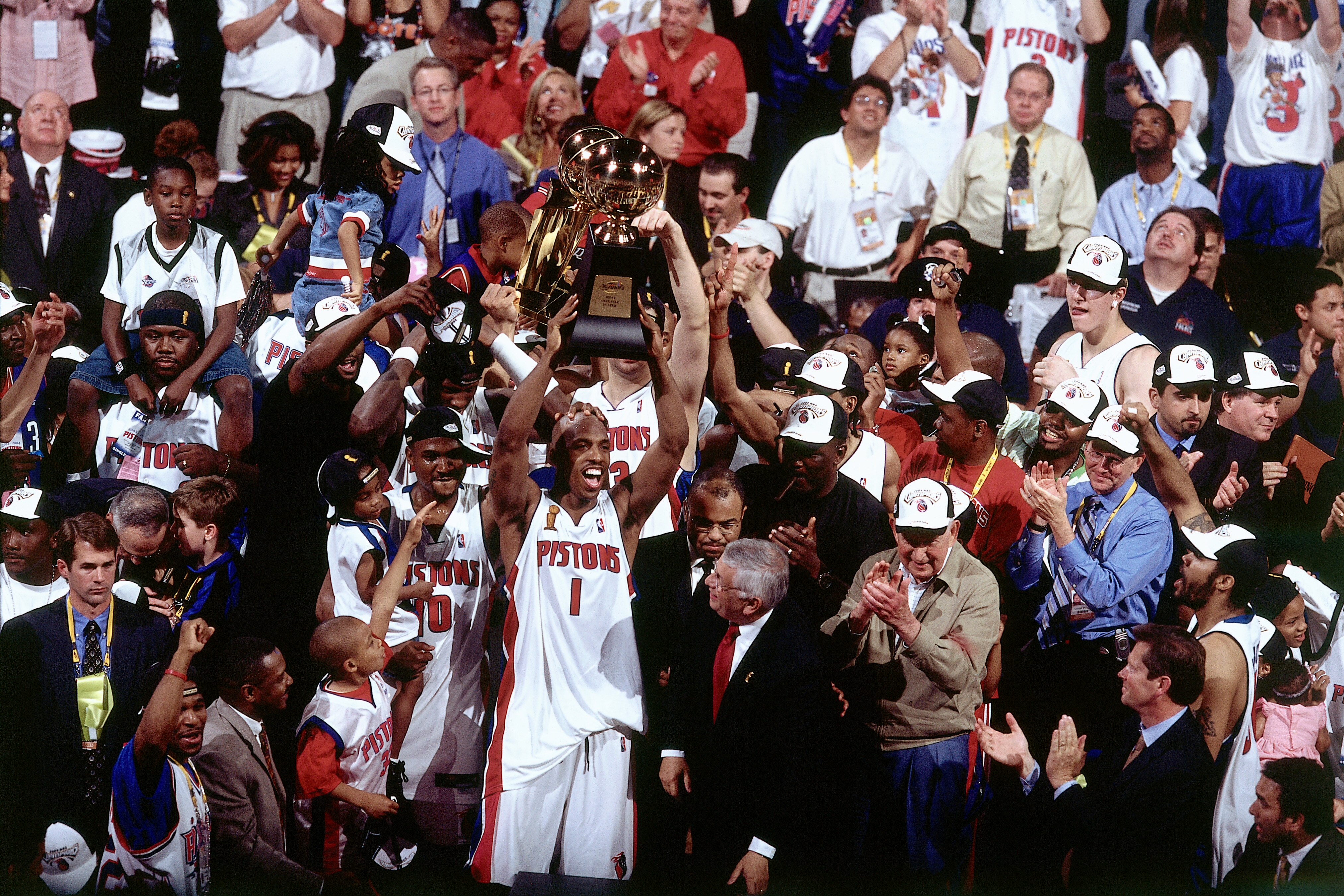
The Detroit Pistons celebrate after winning the NBA Championship in the NBA Finals at The Palace of Auburn Hills in Auburn Hills, June 15, 2004. /VCG
The Detroit Pistons celebrate after winning the NBA Championship in the NBA Finals at The Palace of Auburn Hills in Auburn Hills, June 15, 2004. /VCG
It took the Motor City 14 years to return to the Finals since then. Many things looked different. Instead of the smiling "Daddy Rich" Daly, it was the stubborn, frowner Larry Brown giving instructions along the floor. There were no more Thomas had his malicious smile, Laimbeer and his intimidating moves, or Sally and his punches. Instead, silent, poker-faced Chauncy Billups, roaring Ben Wallace, flippant Rasheed Wallace, and mask-wearing Richard Hamilton stood on the court. On the opposite side stood Shaquille O'Neal, Kobe Bryant, Karl Malone, and Gary Payton and coach Phil Jackson.
There were also things that did not change. For example, the Pistons still had a smothering defense, which only allowed 82 points by the Lakers per game. They did not have superstars, but they knew how to make the opponents' superstars play in the most uncomfortable environment. O'Neal scored averaged 26.6 points at a field goal rate of 63.1 percent, but he only delivered 1.6 assists. Bryant had to defend Hamilton, who never stopped running off screens (and Billups since Game 3). In offense, every time he entered the 3-point line, the Pistons would double- or even triple-team him immediately.
In simply five games, the Pistons defeated the Lakers to win the title for the third time in team history.
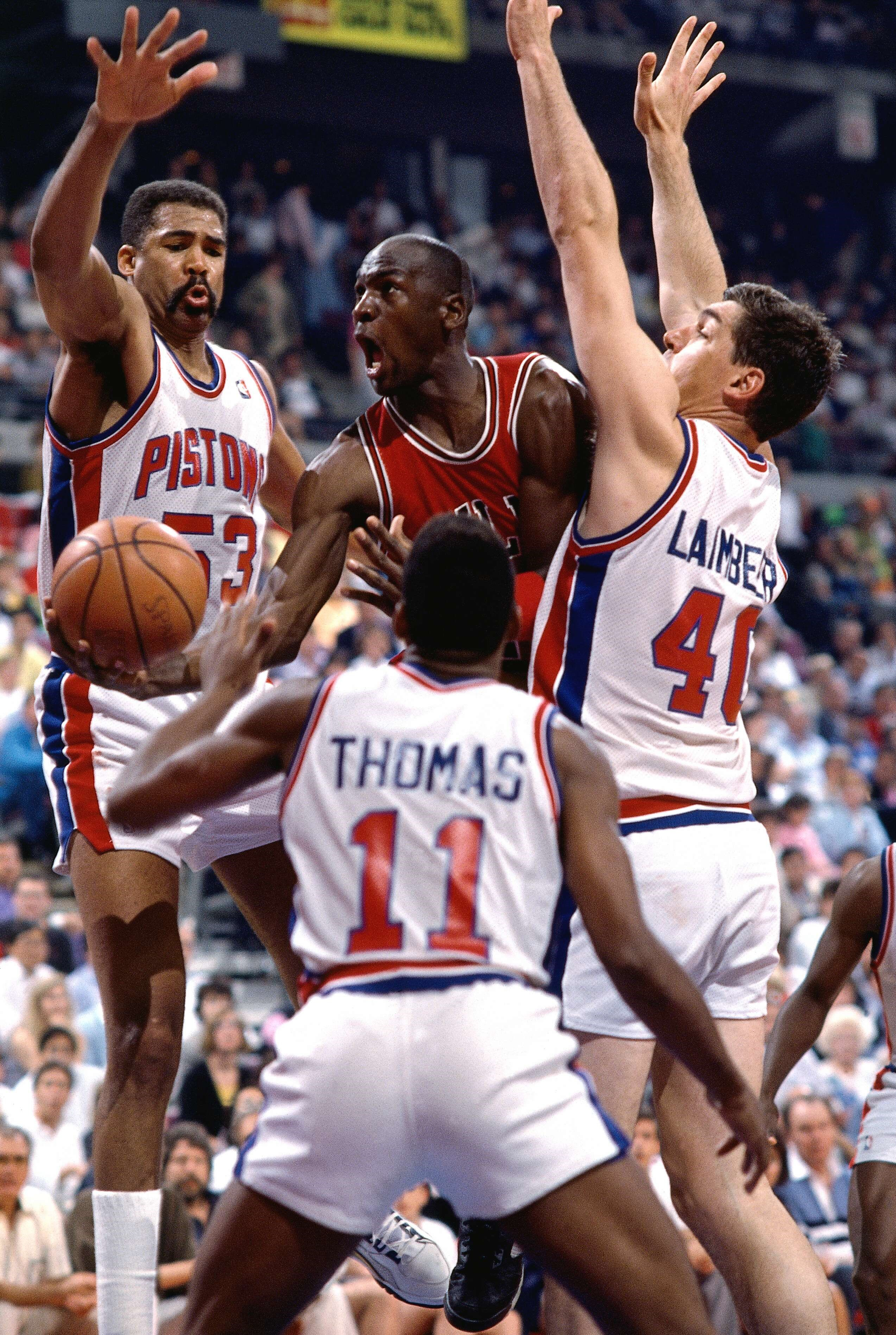
Michael Jordan (C) of the Chicago Bulls tries to shoot the ball under the defense of three players in the game against the Detroit Pistons at the The Palace of Auburn Hills, 1989. /VCG
Michael Jordan (C) of the Chicago Bulls tries to shoot the ball under the defense of three players in the game against the Detroit Pistons at the The Palace of Auburn Hills, 1989. /VCG
The two years the Pistons won titles in a row were also the time in which they pinned down Michael Jordan in the hardest way. Jordan and the Bulls already lost to the Pistons in the 1988 playoffs. When the two sides met again in the 1989 Eastern Conference, Jordan was already a four-time All-Star, two-time scoring champion, Defensive Player of the Year (DPOY), steal leader, Most Valuable Player, double First Team member. Then the Pistons said no and kicked him out with a 4-2.
One year later, Jordan came back with Scottie Pippen, who just made his first NBA All-Star team. Again the Bulls and the Pistons met the in the Eastern Finals. After seven games, Jordan left The Palace again as a loser. After Game 7, Jordan met Jack McCloskey, general manager of the Pistons in the parking lot.
"Mr. McCloskey, Are we ever going to get past the Pistons? Are we ever going to win?" Asked Jordan.
"Michael, your time is coming, and it's coming very soon," answered McCloskey.